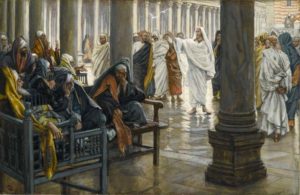Thoughts on Sunday’s Lessons for Nov. 5, 2017

Malheur à vous, scribes et pharisiens (Woe unto You, Scribes and Pharisees) (1886-1894). Painting by James Tissot (1836-1902), Brooklyn Museum.
(Click image to enlarge.)
The people have reached the promised land, and Joshua leads them across the Jordan in a miraculous scene that mirrors their crossing the Sea of Reeds: The river rises up to make a clear, dry path. We mustn’t hear this reading, though, without acknowledging that it shows us a God who will drive out all the people who live there. This ancestral legend may sadly remind us of America’s white settlers driving back and killing our native peoples. From the standpoint of the victors, in ancient Israel and early America, this may have been seen as a good thing for God to do because our people survived and won the battle. In 2017, let’s think about how we might hope that a God of all Earth’s people might care for us all today.
First Reading (Track Two): Micah 3:5-12
We probably know the minor prophet Micah best for his memorable passage toward the end of his short book: “What does the Lord require of you but to do justice, and to love kindness, and to walk humbly with your God?” Here, earlier in the book, he becomes the first of the prophets to predict the coming destruction of Jerusalem, a fate that he calls inevitable as long as its leaders fail to provide justice and equity. False prophets who mislead God’s people face shame and disgrace, he shouts. Jerusalem’s leaders will see the temple plowed like a farmer’s field and the city left in ruins.
Psalm (Track One): Psalm 107:1-7, 33-37
In a hymn of thanksgiving that echoes the ideas in our Joshua reading, we sing gratitude for God’s goodness and enduring mercy. In poetic language its stanzas recall how God redeemed the people from the hands of their foe. God gathered the people and guided them through the desert, took care of their hunger, thirst and low spirits, and delivered them to a bountiful land and a fruitful harvest.
Psalm: (Track Two): Psalm 43
The Psalmist, embattled against ungodly, deceitful and wicked people, calls on God for help and strength. Fearful that God has set him and his needs aside while the enemy oppresses him, the Psalmist prays in beautiful, poetic verses that we may recognize as one of the opening sentences used at the beginning of Morning Prayer: “Send out your light and your truth, that they may lead me, and bring me to your holy hill and to your dwelling.”
Second Reading: 1 Thessalonians 2:9-13
Picking up where last week’s second reading left off, Paul continues assuring the Thessalonians that his ministry to them is reflected in his love for them, in contrast with reports of serious disagreements with his nearby community in Philippi. He remembers how he toiled with them in their labors at the same time as he was proclaiming the Gospel, to prevent his presence among them from being a burden. He loves them as a father loves his children, Paul writes; he thanks God that they accept the Gospel as God’s word at work in them.
Gospel: Matthew 23:1-12
After a series of confrontations in which the Herodians, Saduccees and Pharisees tried to trap Jesus, they finally gave up and no longer dared to ask him questions. Now he scorns his opponents, declaring them hypocrites who avoid work, dress well, and show off their purported holiness by taking the place of honor at banquets and in the synagogues. Do not do as they do, Jesus warns his followers, for they do not practice what they teach. Live and work in humility, not pride, he advises them: “All who exalt themselves will be humbled, and all who humble themselves will be exalted.”
What are “Track 1” and “Track 2”?
During the long green season after Pentecost, there are two tracks (or strands) each week for Old Testament readings. Within each track, there is a Psalm chosen to accompany the particular lesson.
The Revised Common Lectionary allows us to make use of either of these tracks, but once a track has been selected, it should be followed through to the end of the Pentecost season, rather than jumping back and forth between the two strands.
For more information from LectionaryPage.net, click here.
